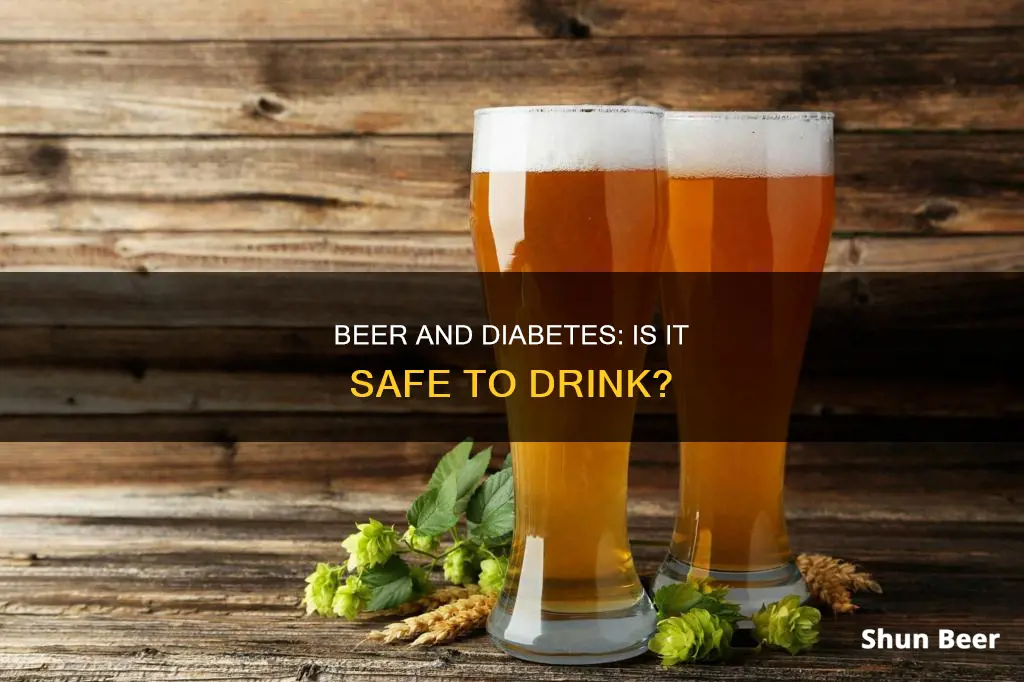
People with diabetes do not need to abstain from alcohol entirely, but they should be mindful of how it can affect their body and how to manage this. Beer is a significant source of carbohydrates, so it can impact blood sugar levels. Beer can also be high in calories, which may contribute to weight gain over time. Additionally, the ADA states that drinking alcohol can slow down carb metabolism, potentially leading to low blood sugar (hypoglycemia). Therefore, it is essential for people with diabetes to be cautious when consuming beer and to monitor their blood sugar levels before, during, and after drinking.
| Characteristics | Values |
|---|---|
| Can people with diabetes drink beer? | Yes, but in moderation. |
| How much is too much? | Alcohol consumption recommendations are the same for people with diabetes as the rest of the population: no more than one drink a day for women and up to two drinks a day for men. |
| What is one drink of beer? | One serving of beer is 12 ounces, or one can or bottle of beer. |
| What are the risks of drinking beer with diabetes? | Excessive drinking can lead to raised blood pressure, worsen neuropathy (nerve damage), dehydration, sleep disruption, certain cancers, and heart disease. |
| How does beer impact blood sugar levels? | Beer contains carbohydrates and alcohol, which can impact blood sugar levels. Beer can cause blood sugar to spike and then fall quickly, potentially leading to hypoglycemia (low blood sugar). |
| How to drink beer safely with diabetes? | Drink in moderation, don't drink on an empty stomach, pace yourself, drink plenty of water, and check blood sugar levels frequently. |
What You'll Learn

Beer and blood sugar levels
Beer can impact your blood sugar levels in several ways. Firstly, beer contains carbohydrates that are quickly absorbed into the bloodstream, leading to increased glucose levels. This can be particularly dangerous for people with diabetes, as it can cause a rapid spike in their blood sugar. Additionally, alcohol interferes with the hormones that regulate blood sugar levels, and can affect the effectiveness of diabetes medications. For people with type 1 diabetes or type 2 diabetes using insulin, drinking alcohol can increase the risk of hypoglycemia, or low blood sugar. This can lead to symptoms such as fatigue, sweating, irregular heartbeat, confusion, blurred vision, and even seizures or loss of consciousness.
The amount and type of beer consumed also play a role in blood sugar levels. Craft beers, for example, tend to have more calories and carbohydrates than bottled beers. Drinking beer in moderation, such as limiting to one to two drinks per day, can help mitigate some of these effects. It is also recommended to avoid drinking on an empty stomach, as it can impair the liver's ability to release glucose into the blood and cause a more significant drop in blood sugar levels.
Furthermore, alcohol stimulates appetite, which can lead to overeating and further increase blood sugar levels. Drinking beer can also contribute to weight gain over time due to its calorie content. Additionally, drinking excessively can lead to long-term health complications such as high blood pressure, heart disease, nerve damage, and eye disease.
For people with diabetes, it is crucial to monitor blood sugar levels before and after drinking beer, as well as up to 12-24 hours later. This will help identify any dangerous spikes or dips in blood sugar levels. It is also important to be mindful of the symptoms of low blood sugar, as they can be similar to those of alcohol consumption, such as dizziness or lightheadedness.
In conclusion, while people with diabetes can usually drink beer safely, it is essential to be aware of the risks and take the necessary precautions to maintain healthy blood sugar levels.
Ibuprofen and Beer: Is It Safe to Mix?
You may want to see also

Alcohol and diabetes medications
If you have diabetes, drinking alcohol can affect your blood sugar levels and interact with your medication. It's important to be aware of how alcohol can affect your body and how to manage this.
Firstly, alcohol competes with your liver's ability to regulate blood sugar. The liver is responsible for clearing alcohol from your system, and this may delay the release of necessary sugars into the bloodstream. This can lead to hypoglycaemia (low blood sugar) and, in extreme cases, loss of consciousness. This risk is heightened if you are taking insulin or other anti-hyperglycaemic medications, and it can last up to 24 hours after drinking.
Drinking alcohol can also cloud your judgement, so you may not realise that your blood sugar is low. The symptoms of hypoglycaemia, such as slurred speech, drowsiness, confusion and dizziness, are similar to the symptoms of being drunk. It's important to be aware of these symptoms and to alert those around you, so they can help if necessary.
To prevent hypoglycaemia, avoid drinking on an empty stomach. Eat a meal or snack containing carbohydrates before or while you drink alcohol, and always stay hydrated by drinking plenty of water. Check your blood sugar levels before you drink, while you drink, and for up to 24 hours after drinking.
If you are taking metformin to treat type 2 diabetes, drinking alcohol can lead to additional risks, including the rare but serious side effect of lactic acidosis. This is caused by a buildup of lactic acid in your blood, which can cause serious damage to your kidneys, lungs, heart and blood vessels.
If you have diabetes, it's important to talk to your doctor about how alcohol may impact your condition and your medication. They can advise you on how to drink safely or whether you should avoid alcohol altogether.
Beer and Pepsi: A Match Made in Heaven?
You may want to see also

Recommended serving sizes
Beer is a staple beverage for many, but it can be tricky to navigate as a diabetic. It is important to know how to drink safely to keep your blood sugar in a healthy range and avoid complications.
According to the National Institute on Alcohol Abuse and Alcoholism, one serving of beer is 12 fluid ounces (360 ml) and 5% alcohol. This is considered one drink. However, it is important to note that in bars and restaurants, pours may differ, with a pint glass holding 16 ounces. Therefore, a good rule of thumb is to limit yourself to no more than one drink per hour and no more than three or four drinks per day for women, and four drinks for men.
If you are drinking beer, it is best to choose light beers, as they have the fewest carbs, typically five grams or less per serving, and a lower alcohol content. Hoppy craft beers like IPAs and stouts tend to be much higher in carbs, with 15 grams or more per serving, and they also tend to be higher in calories.
If you are drinking beer, it is important to be mindful of your blood sugar levels and to drink in moderation. The 2020-2025 Dietary Guidelines for Americans recommend that females limit their daily alcohol intake to one drink per day, and males limit their intake to two drinks per day. If you are drinking beer, stick to one 12-ounce can, which is considered one drink.
It is also important to note that drinking on an empty stomach can lead to hypoglycemia, so it is best to have food with your beer and to check your blood sugar levels often while drinking and up to 24 hours after you stop drinking.
Arymina and Beer: A Safe Mix?
You may want to see also

Drinking beer with a meal
When drinking beer with a meal, it is also important to be mindful of the type of beer being consumed. Beer is typically higher in carbohydrates than other alcoholic drinks, and the carb content can vary depending on the type of beer. "Light" beers tend to have the fewest carbs, usually five grams or less per serving, and are also lower in alcohol content. On the other hand, craft beers like IPAs and stouts tend to be much higher in carbs, often containing 15 grams or more per serving. Therefore, when drinking beer with a meal, it is generally better to choose a light beer.
It is also important to monitor your blood sugar levels when drinking beer with a meal. This is because the effects of alcohol on blood sugar can last for up to 24 hours after drinking. Additionally, it is important to be aware of the symptoms of hypoglycemia, such as dizziness, loss of consciousness, slurred speech, drowsiness, confusion, or difficulty walking, as these can be similar to the symptoms of drunkenness.
It is worth noting that drinking beer with a meal may affect weight loss goals, as alcoholic drinks can be high in calories. Additionally, alcohol can stimulate the appetite, leading to overeating and affecting blood sugar control. Therefore, when drinking beer with a meal, it is important to be mindful of portion sizes and calorie intake.
In conclusion, while people with diabetes can drink beer with a meal, it is important to be mindful of the type of beer, monitor blood sugar levels, and be aware of the symptoms of hypoglycemia. Drinking beer in moderation and following medical advice is crucial for managing diabetes effectively.
Is Day-Old Beer Safe to Drink?
You may want to see also

Beer and weight gain
Drinking alcohol can also prevent your body from burning fat. This is because your body prioritises breaking down alcohol over other energy sources, including stored fat. Regular drinking, therefore, may contribute to an increase in body fat.
Men are more likely to gain weight from drinking beer than women. This is because men tend to drink more heavily and store fat around their belly when they gain weight. Men are also more likely to drink beer, which contains more calories than many other alcoholic drinks.
However, moderate drinking of one beer per day or less is not linked to significant weight gain. Binge drinking, on the other hand, will lead to weight gain.
If you are concerned about weight gain, there are several types of beer that are lower in calories that you can try. These include Budweiser Select 55, Amstel Light, and Guinness. You can also try non-alcoholic or alcohol-free beers, which have about a third of the calories of standard beer.
Beer and Sex: A Match Made in Heaven?
You may want to see also
Frequently asked questions
Yes, people with diabetes can drink beer, but they need to be cautious and aware of how it can affect their body and how to manage this. It is recommended to drink in moderation and monitor blood sugar levels.
Drinking beer with diabetes can cause blood sugar levels to rise or fall. Beer contains carbohydrates and may raise blood sugar. Alcohol can also affect judgement and willpower, leading to poor food choices. Additionally, drinking on an empty stomach can cause blood sugar to spike and then fall quickly, potentially causing hypoglycaemia.
People with diabetes should drink in moderation, following the recommended guidelines of no more than one drink per day for women and up to two drinks per day for men. It is also advised to drink with food, as this slows down the absorption of alcohol and helps to keep blood sugar levels stable. Checking blood sugar levels before, during, and up to 24 hours after drinking is important to ensure they stay within a safe range.







